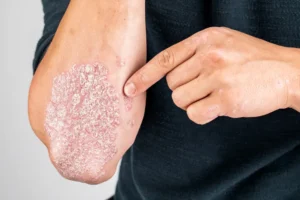 Psoriasis is an autoimmune skin condition that causes itchiness and discomfort. Plaque psoriasis is the most common type. It causes thick, scaly areas of skin. While there isn’t a cure, ayurvedic psoriasis treatment in Pune can help manage symptoms. Your provider may prescribe special creams or ointments for psoriasis. Psoriasis is an autoimmune condition that causes inflammation in your skin. Symptoms of psoriasis include thick areas of discolored skin covered with scales. These thick, scaly areas are called plaques.
Psoriasis is an autoimmune skin condition that causes itchiness and discomfort. Plaque psoriasis is the most common type. It causes thick, scaly areas of skin. While there isn’t a cure, ayurvedic psoriasis treatment in Pune can help manage symptoms. Your provider may prescribe special creams or ointments for psoriasis. Psoriasis is an autoimmune condition that causes inflammation in your skin. Symptoms of psoriasis include thick areas of discolored skin covered with scales. These thick, scaly areas are called plaques.
Psoriasis is a chronic skin condition, which means it can flare up unexpectedly, and there’s no cure.
What are the types of psoriasis?
There are several types of psoriasis, including:
- Plaque psoriasis: Plaque psoriasis is the most common type of psoriasis. About 80% to 90% of people with psoriasis have plaque psoriasis.
- Inverse psoriasis: This type appears in your skin folds. It causes thin plaques without scales.
- Guttate psoriasis: Guttate psoriasis may appear after a sore throat caused by a streptococcal infection. It looks like small, red, drop-shaped scaly spots and often affects children and young adults.
- Pustular psoriasis: Pustular psoriasis has small, pus-filled bumps on top of plaques.
- Erythrodermic psoriasis: This is a severe type of psoriasis that affects a large area (more than 90%) of your skin. It causes widespread skin discoloration and skin shedding.
- Sebopsoriasis: This type typically appears on your face and scalp as bumps and plaques with a greasy, yellow scale. This is a cross between psoriasis and seborrheic dermatitis.
- Nail psoriasis: Nail psoriasis causes skin discoloration, pitting, and changes to your fingernails and toenails.
Psoriasis rash can show up anywhere on your skin. Psoriasis is common on your:
- Elbows and knees.
- Face and inside of your mouth.
- Scalp
- Fingernails and toenails.
- Genitals
- Lower back.
- Palms and feet.
In most people, psoriasis covers a small area of their skin. In severe cases, the plaques connect and cover a large area of your body.
What are the symptoms of psoriasis?
In addition to skin plaques or a rash, you might have symptoms that include:
- Itchy skin.
- Cracked, dry skin.
- Skin pain.
- Nails that are pitted, cracked, or crumbly.
- Joint Pain
If you scratch your plaque, you could break open your skin, which could lead to an infection. Infections are dangerous. If you experience severe pain, swelling, and a fever, you have symptoms of an infection. Contact your healthcare provider if you have these symptoms.
What causes psoriasis?
An over-reactive immune system that creates inflammation in your skin causes psoriasis.
If you have psoriasis, your immune system is supposed to destroy foreign invaders, like bacteria, to keep you healthy and prevent you from getting sick. Instead, your immune system can mistake healthy cells for foreign invaders. As a result, your immune system creates inflammation or swelling, which you see on the surface of your skin as skin plaques.
It usually takes up to 30 days for new skin cells to grow and replace old skin cells. Your over-reactive immune system causes the timeline of new skin cell development to change to three to four days. The speed of new cells replacing old cells creates scales and frequent skin shedding on top of skin plaques.
Psoriasis runs in families. There may be a genetic component to psoriasis because biological parents may pass the condition down to their children.
Treatment
Ayurveda is considered Psoriasis due to the imbalance of tri doshas. Therefore, ayurvedic treatment for Psoriasis focuses on expelling the excessive or vitiated doshas and regaining the equilibrium. The doshas accumulated in the body tissues will be removed systematically by internal consumption and external application of herbal medicines and oils.
As Ayurveda uses only natural substances and herbal concoctions, the treatment does not cause any side effects, unlike other treatment methods. Other medical fields may use heavy-dose medications that can affect the body adversely. Ayurvedic treatment method for psoriasis aims at removing the disease from the root level. Thereby, precluding the possibility of recurrence.
Other medical fields will only be effective on the skin. That will resolve the symptoms externally only. Thus resulting in the recurrence of the disease, as the underlying factors for Psoriasis still exist inside the body. Ayurveda cure for Psoriasis is comprehensive and hence less likely to recur.
The Ayurveda doctors will examine the patient and prescribe medicines for a particular period. Therefore, you do not have to continue medicines for a lifetime, which is not the case with other treatment methods. The ayurvedic treatment method eliminates Psoriasis at the root level in a comparatively short course of treatment.

